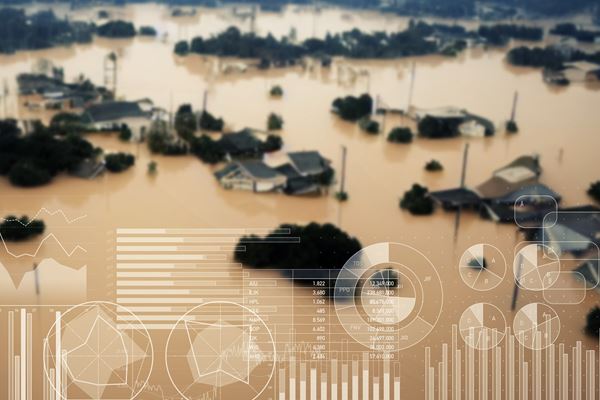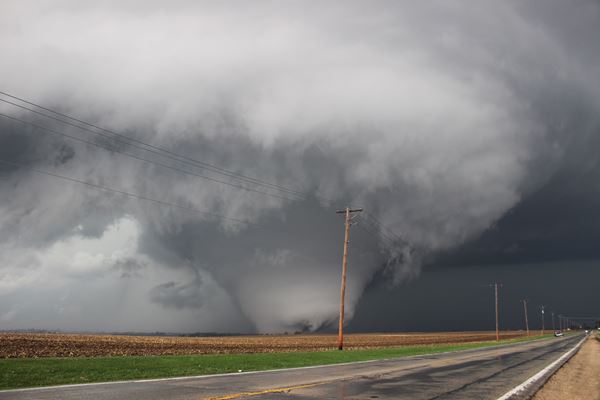Hailstorms in the United States: Causes, Risks, and Impact on Agriculture and Insurance

With storms impacting areas from Texas and Oklahoma to central Florida in late April 2023, hail is once again in the news as we continue into the heart of severe weather season for most of the United States. Tornadoes and hurricanes may receive the majority of the public’s attention when it comes to severe weather, but hail is also a major concern for citizens and insurance companies.
Hailstorms are among the most damaging weather events in the United States. According to the National Oceanic and Atmospheric Administration (NOAA), hailstorms cause an average of $1 billion in damages to property and crops every year1. While hailstorms can occur in any part of the country, some areas are more prone to hail damage due to their location, climate, and topography.
Additional Resource on Hail Damage: Assessing a Property for Hail Damage | Envista Forensics
How Does Hail Form?
Hail is a type of precipitation that forms when strong updrafts in thunderstorms carry raindrops high into the colder regions of the atmosphere, where they freeze into ice pellets. As these frozen pellets are carried up and down within the storm's cloud, they collect layers of water droplets that freeze onto their surface. This process of accumulating layers of ice and water continues until the hailstone becomes too heavy for the updrafts to hold, and it falls to the ground, causing damage to anything in its path.
The size of hailstones can vary greatly, ranging from pea-sized to as large as grapefruits or even softballs. The non-uniform shape of hailstones is a result of the varying environmental conditions that the hailstones encounter as they develop. Additionally, the irregular shape of hailstones can also be attributed to the collision and merging of smaller hailstones within the storm cloud.
High-Risk Areas for Damage from Hail
The central United States is an area that is particularly vulnerable to hailstorms. This region, known as "Hail Alley," encompasses parts of Texas, Oklahoma, Kansas, Nebraska, Colorado, Wyoming, and South Dakota. Within Hail Alley, the highest risk for hail damage is concentrated along the Front Range of the Rocky Mountains, which includes Colorado Springs, Denver, and Fort Collins, and extends into western Nebraska and South Dakota.
This area experiences a unique combination of moisture from the Gulf of Mexico and cold air from the Rockies, creating the perfect conditions for hail formation. In fact, the area sees an average of three to four major hailstorms per year, with hailstones often reaching the size of golf balls or even softballs. The resulting property damage and insurance claims can be devastating for homeowners and businesses in the region
Hail Season
Hailstorms can occur at any time of the year, but they are most common in the spring and summer months when thunderstorms are more frequent. The peak hail season in the Great Plains region is from May to July, with the most significant hailstorms typically occurring in late May and early June. While it's true that some areas are more prone to hailstorms than others, hail can occur anywhere that thunderstorms are present.
Dangers of Hailstorm Damage to Agriculture and Livestock
Hailstorms can cause significant damage to crops, especially those that are close to harvest. Hailstones can bruise or puncture fruits and vegetables, damage leaves, and break branches. In addition, hail can strip plants of their protective coverings, leaving them vulnerable to diseases and pests. Livestock can also be at risk during hailstorms, as they can suffer from injuries and stress due to loud noise and sudden changes in temperature.
Impact of Hail Damage on Insurance
Hail damage is one of the most common claims filed by homeowners and businesses to their insurance companies. According to NOAA, the total damage from hail in the U.S. was just over $1 billion in 20212. In recent years, the cost of hail damage has been rising due to the increased severity and frequency of hailstorms. Insurers are responding by raising premiums and deductibles in hail-prone areas, and some are also using new technologies, such as artificial intelligence and weather modeling, to better predict and manage risk.
One of the most extreme hailstorms on record occurred in Vivian, South Dakota, in 20103. A hailstone that fell during this storm measured a staggering 8 inches in diameter, making it the largest hailstone ever recorded in the United States. The storm caused extensive damage to buildings, vehicles, and crops in the area. In addition to the record-breaking hailstone, several six-inch hailstones were identified in that same storm.
Another significant hailstorm occurred in Denver, Colorado, in 1990. During this storm, hailstones the size of baseballs fell from the sky, causing $625 million in damage ($1.23 billion adjusted to 2020 dollars)4.
While these extreme hailstorms are certainly noteworthy, it's important to remember that even smaller hail can cause significant damage. Hailstones that are only an inch or two in diameter can dent cars, break windows, and damage roofs.
Hailstorms are a significant weather hazard in the United States, often causing over one billion dollars in yearly damages. While hail can occur anywhere, some areas are more susceptible than others due to their climate and topography. Farmers and ranchers are particularly vulnerable to hail damage, which can devastate crops and harm livestock. Insurance companies are also affected by hailstorms, as they must pay out billions of dollars in claims. As the frequency and severity of hailstorms continue to increase, it is crucial to develop strategies to mitigate the impact of hail and reduce the risk of damage.
This article was technically reviewed by Steven Clark, Expert Alliance Associate and Forensic Meteorologist. If you have a matter for one of our forensic meteorologists, please reach out to Envista.
Sources:
1: https://experiencedpublicadjusters.com/hrf_faq/hail-size-explained-what-size-hail-will-cause-hail-damage-to-your-home-or-your-business/
2: https://www.wunderground.com/article/safety/thunderstorms/news/2023-04-28-hail-hailstorms-damage-cost
3: https://www.weather.gov/abr/vivianhailstone
4: https://www.9news.com/article/weather/denver-devastating-hailstorm-30-years-ago-july-11/73-103e25f6-f039-4e68-b94c-beef409bf689
Nuestros consultores están listos para ayudar.


